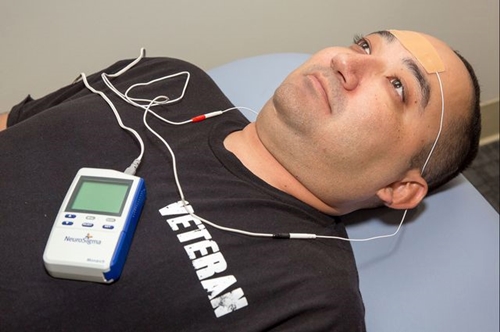28 January 2016. An electronic device stimulating nerves in the brain was shown in a small clinical study to relieve symptoms associated with post-traumatic stress disorder, or PTSD, and depression. The team developing the patch and taking it to market published results of the study in today’s (28 January) issue of the journal Neuromodulation: Technology at the Neural Interface; paid subscription required.
People who experience or witness a terrifying event can experience nightmares or flashbacks for periods of time after the event, which can subside with counseling or help from family and friends. For some people, however, the reminders continue and can develop into PTSD, marked by anxiety or depression, often with debilitating effects on their families, jobs, and personal relationships. Anxiety and Depression Association of America says some 7.7 million Americans age 18 and older have PTSD, including two-thirds of people experiencing mass violence, such as members of the military.
A team from University of California in Los Angeles and the company NeuroSigma Inc. tested a device, which they say can offer an alternatives or supplement to psychotherapy and medications, such as anti-depressants and anxiety drugs now often prescribed. Senior author of the study psychiatry professor Andrew Leuchter and lab colleagues developed a technology that stimulates the trigeminal nerve, a major cranial nerve that connects to a number of motor and sensory regions, including the sympathetic nervous system involved with “fight or flight” reactions.
Trigeminal nerve stimulation is a type of neuromodulation that sends mild electronic impulses through the trigeminal nerve to make modest and subtle changes in the neural connections interrupted by the severe traumatic events. Some neuromodulating devices are implanted, but Leuchter and colleagues developed a non-invasive patch, worn on the forehead that provides stimulation to the trigeminal nerve.
Ian Cook, psychiatrist also trained as an electrical engineer, is co-inventor of the device while in Leuchter’s lab. Cook is a co-founder of NeuroSigma Inc. that licensed the technology from UCLA for commercialization. The device developed by the company has a single use patch attached to the forehead, connected to an electronic signaling generator about the size of a mobile phone, powered by a 9-volt battery.
The Los Angeles company is developing the system as a treatment for PTSD, s well as epilepsy, depression, traumatic brain injury, and attention deficit hyperactivity disorder or ADHD. Cook is on leave from UCLA, and serving as NeuroSigma’s chief medical officer.
In the study, 12 adults with PTSD wore the patch every night for 8 hours, over an 8 week period, in addition to taking their prescribed medications. During that time participants were monitored and evaluated with a series of standard checklists and rating scales measuring PTSD and depression, as well as a quality of life and satisfaction questionnaire.
The results show after 8 weeks of treatment, participants had 30 percent lower scores on the PTSD checklist and 50 percent reductions depression rating scales, as well as higher scores on the quality of life questionnaire. The study team reports 3 of the 12 patients went into remission with their PTSD, and participants overall experienced few adverse events as a result of the treatments.
The device, known as Monarch, is already approved for us in Europe, Canada, and Australia. Leuchter and NeuroSigma are planning a larger clinical trial of the device, recruiting 74 military veterans with PTSD, randomized to receive treatments from the NeuroSigma device or a placebo system. The findings from the trial are expected to help gain clearance for the device from FDA.
Read more:
- Boehringer, Arena to Discover Neurological Drugs
- Detailed Brain Activity Imaging Being Developed
- Trial Testing MRI Depression Treatment with Teens
- Novartis Licensing Depression Therapy Technology
- Antipsychotic Drug Savings Expected as Patents Expire
* * *


 RSS - Posts
RSS - Posts
[…] Electronic Patch Shown to Help Relieve PTSD, Depression […]